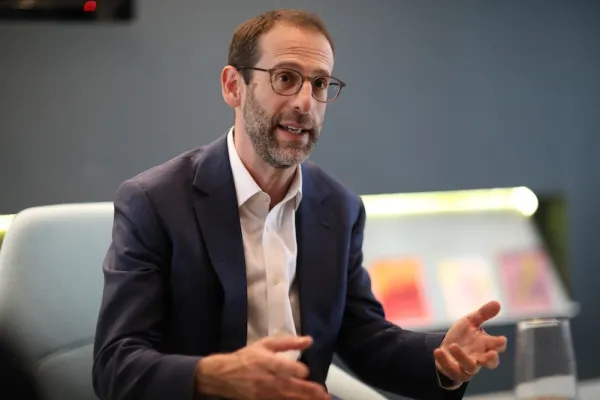The idea came to him during an appearance on an Italian radio show in March 2002. Carnegie Mellon University economics professor Adam Lerrick had been invited to discuss Argentina's default four months earlier on $50 billion in debt. Some 350,000 Italians own Argentinean bonds, and the program host asked Lerrick point-blank if they would be shoved aside in a debt restructuring in favor of institutional investors. "I said that the Italian investors' fears of discrimination against retail investors were well founded," recalls Lerrick. "It is the obvious strategy if Argentina can implement it."
Seeing the injustice of the situation, and sensing an opportunity, Lerrick, who used to design new products on Wall Street, wondered if there might not be a way to harness the latent negotiating power of the 600,000 European and Japanese retail investors who own half of Argentina's private foreign currency debt. This May, Lerrick set up a company to help such investors bring their collective weight to bear on Buenos Aires in arranging a formula for repaying at least some portion of the busted bonds.
His special-purpose vehicle, the Argentine Bond Restructuring Agency, would gather up investors' Argentinean bonds and issue them certificates in return. The program would be strictly voluntary. Ownership rights to the bonds would remain with the investors, but the certificates could be redeemed for bonds at any time.
Once debt restructuring talks got under way in earnest, ABRA would vote the pooled bonds on behalf of retail investors, in theory counterbalancing the might of the institutions. And once the restructuring was complete and replacement bonds had been issued, ABRA would transfer those to the original investors.
"[The plan] is addressing one of the most important and most intractable features of sovereign indebtedness: hundreds of thousands of bondholders acting independently or without a voice," contends Angel Gurría, the former Mexican Finance minister (and veteran debt negotiator) who was recruited by Lerrick to help present the retail investors' case.
But is Lerrick a noble savior or a manipulative meddler? That is being debated almost as intensely as the debt-restructuring terms are sure to be. For a start, institutional money managers and vulture investors flat out reject Lerrick's operating premise that Argentina would give short shrift to retail bondholders in the first place. "I'd be astonished if there was a big temptation or room for discrimination," says Michael Gavin, chief economist for Latin America at UBS Warburg. "It is a little paranoid to think that Argentina will squeeze retail and not the other guys."
For his part, Lerrick scoffs at the notion that Argentina will play fair, despite government officials' insistence that they will treat all foreign creditors alike. "These are the same people who are discriminating in favor of Argentine creditors," says Lerrick. "Large institutional investors have lawyers and financial advisers. All we are trying to do is give retail the same power and skills."
To underscore his point, Lerrick cites EM Ltd., a Cayman Islands entity owned by vulture investor Kenneth Dart that has sued for payment in full of its $600 million in Argentinean bonds. Dart wouldn't have done that if he believed all investors would get equal treatment, Lerrick says. Mohammed El-Erian, emerging-markets portfolio manager for giant U.S. bond manager Pimco, observes, "It is initially easy to say [you won't discriminate], but it will be a difficult decision when people realize that the pie isn't big enough for everyone."
Critics of ABRA argue that retail investors would do better if they threw in their lot with other creditors, thereby increasing the pot, instead of letting Buenos Aires play one group off against another. "Our biggest interest is a common one, and that is to increase the size of the pie," asserts Peter Allen, financial adviser to the Argentine Bondholders Committee, which is dominated by institutions. Lerrick's idea, Allen complains, "is to gain bargaining power not vis-à-vis the sovereign, but vis-à-vis U.S. institutional investors, and that is flawed."
What's more, the critics carp, Lerrick isn't qualified to be a sovereign debt negotiator, and he's charging retail investors too much to boot. One emerging-markets portfolio manager dismisses Lerrick's plan as another of his "cockamamie" ideas.
Certainly, Lerrick is a controversial figure in financial circles. Fast-talking, intense and hyperconfident, the 46-year-old Ph.D. in economics from the Massachusetts Institute of Technology once headed product development for Salomon Brothers and, later, for Credit Suisse First Boston. "His strength was his intellect," recalls Richard Grand-Jean, manager of Lerrick's group at Salomon and now a partner at investment bank Abel's Hill Capital Corp.
Lerrick left Wall Street in 1990 to run his own investment banking shop, winding it up after nine years to pursue an interest in international economic policy. In 1999 he became an adviser to Allan Meltzer, the respected conservative monetarist at Carnegie Mellon. Congress had tapped Meltzer to head a commission on reforming international financial institutions. Lerrick played a key behind-the-scenes role in shaping the commission's March 2000 report, which faulted the International Monetary Fund's country-bailout policies and the World Bank's lending practices.
Derided by IMF and Bank officials and many development economists as both uninformed and misguided, the Meltzer report nevertheless set the agenda for revamping the world's financial architecture. Among its contentious proposals: The Bank should provide poor countries with grants instead of loans, and the IMF should end emerging-market liquidity crises by providing short-term collateralized loans at high interest rates.
Lerrick has won notable support for ABRA. Germany's HVB Group and German investor protection association Deutsche Schutzvereinigung für Wertpapierbesitz are backing ABRA directly. Cooperating banks include Commerzbank, WestLB and Sal. Oppenheim Jr. & Cie. ABRA's advisory board adds sheen: former Bundesbank chief Hans Tietmeyer and exAustrian Finance minister Ferdinand Lacina, among others.
On May 9, ABRA issued an offering circular and began collecting bonds in Europe. By mid-June the Dublin-based organization had gathered more than $1 billion (face value) worth. Now, like it or not, the big institutions holding Argentinean bonds must reckon with Lerrick.
Perhaps the cleverest aspect of the whole ABRA scheme is the most controversial: the fee structure. Lerrick observed that Argentina's euro bonds and yen bonds -- the ones held largely by retail investors -- traded at a significant discount to the country's global bonds, which are held mainly by institutional investors. Last spring the euro bonds traded 3 to 5 points lower than the global bonds and the yen bonds 5 points lower. "A large portion of the difference was due to the expected discrimination [against retail investors]," Lerrick maintains. That is, the market expected the institutions to fare better in a restructuring.
The best benchmark of ABRA's success, Lerrick reasoned, was a narrowing or elimination of that gap, since this would indicate that the market had become convinced that Argentina would not dare discriminate against the now-organized retail investors. Thus, in addition to a management and distribution fee of 1.3 percent of a bond's face value, which is payable to the participating banks, ABRA charges a performance fee equal to 20 percent of any gain in eliminating the discount on euro bonds relative to dollar bonds. "The week we announced our deal, the discount went to zero," brags Lerrick. Assuming that ABRA takes in $2 billion in bonds, this hedge-fund-like formula could earn the four-person negotiating team led by Lerrick and Gurría $16 million.
Money managers, however, dispute that Lerrick can really reduce the price differential between the global and the euro and yen bonds. Much of the gap, they say, is because of different exchange rate projections and the euro bonds' relative lack of liquidity. "The differential exists not only because retail is going to get screwed, but because these bonds are illiquid," says Maziar Minovi, an emerging-markets portfolio manager at David L. Babson & Co. "To a large extent, Lerrick would be taking advantage of market dynamics rather than adding value."
No doubt, some of the griping about ABRA is sour grapes. Vulture investors worry that it could compromise their claim to be out to get all investors a better deal. "The vultures are very upset," says Lerrick. "They say they work on behalf of widows and orphans, but that doesn't fly if the widows and orphans have transferred their bonds to ABRA -- they're just vultures, not Robin Hoods." Hans-Jörg Rudloff, executive committee chairman of Barclays Capital (and chairman of CSFB during Lerrick's time there), notes, "The vulture fund industry is unhappy about Lerrick's Argentina plan and is spreading rumors about him."
Another of Lerrick's old bosses, Grand-Jean, says that ABRA "has all the earmarks of being something very clever. If he does it for Argentina, it won't be the last country, and even though it can be copied, you can't copy Lerrick, you can't copy Gurría."
As for Buenos Aires' take on ABRA, Finance Secretary Guillermo Nielsen is ready to negotiate with Lerrick and company. But as one senior Argentinean economic official puts it: As a creditor, "you can do your own work or have someone else do it for you. If you decide on the latter, then you have to pay."





